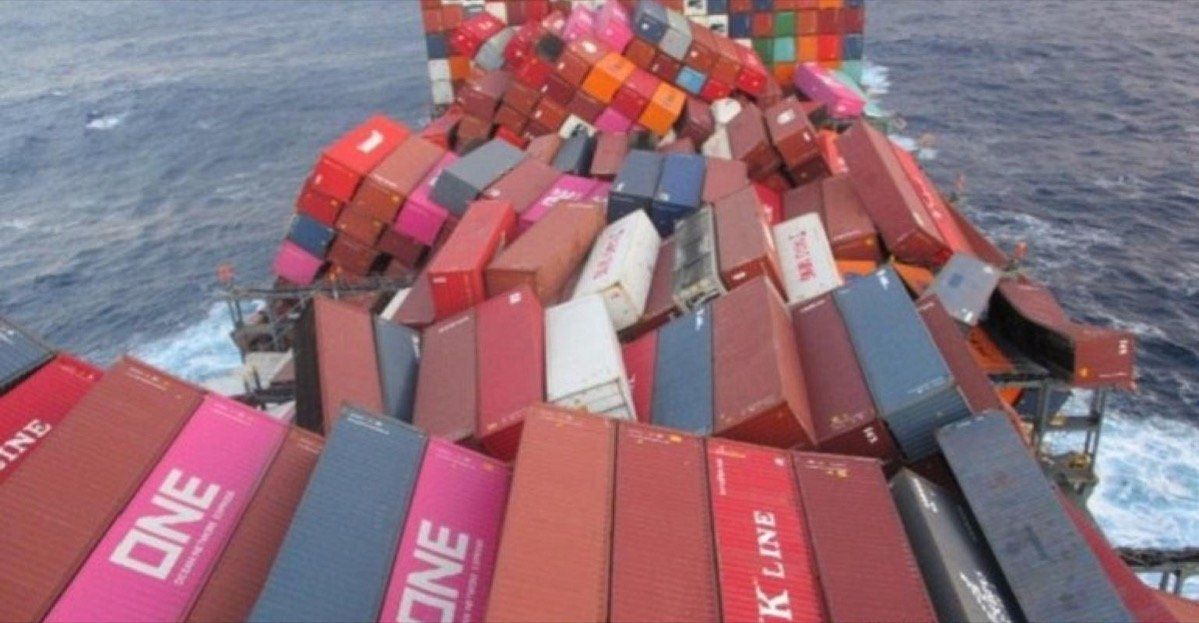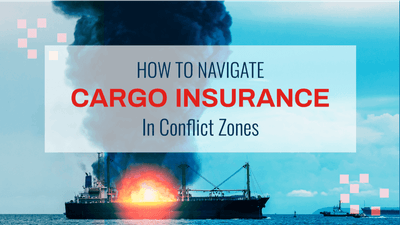December 23, 2020 | Cargo Insurance, Industry Insights
Planning Ahead for a Potential General Average

ONE Apus via Twitter
On November 30th, the cargo ship, ONE Apus, sailing from Yantian, China to Long Beach, CA, encountered severe weather. Swells exceeding 20 feet struck the vessel. An estimated 1816 containers were lost overboard, and containers remaining onboard received significant damage. Current estimates are that over $200 million worth of cargo was lost or damaged. The ship is now berthed in the port of Kobe, Japan, where operations are underway to remove containers.
One of the most pressing unknowns around this accident is whether or not the vessel owners will declare a General Average (GA). A General Average is a partial loss shared proportionally by all parties involved in the voyage, namely the cargo owners and the vessel owner. In a GA, cargo owners are expected to contribute financially to the voyage loss, and they need to post a financial guarantee, usually in the form of a bond, to have their goods released.
If you find yourself fielding calls from clients who have cargo damaged or lost at sea and may also need to navigate through the difficulties of a General Average, some general guidelines can help you walk them through this trying time.
Insured cargo:
Cargo insurance is designed to respond to claims for damaged or lost cargo and expenses for the GA Contribution required to release cargo. The Roanoke claims team will work directly with the insurance company to post the security deposit or GA Guarantee and provide documents needed to expedite the cargo’s release. Please refer to the Claims section on our website for detailed instructions and a list of required documents. You can also contact the claims team directly at 847.969.7064 or via email at insuranceclaims@roanokegroup.com.
Uninsured cargo:
When cargo is uninsured, the cargo owner must inform the Average Adjuster as soon as possible, and the adjuster will require a cash deposit in the place of an insurer’s Average Guarantee. The cargo owner should contact the Average Adjuster directly to post the bond. It’s important to note that the cargo owner’s security is held until the GA adjustment is complete. This process can last for two years or more, and if it is less than the final adjusted amount, the security may never be returned.
Recommendations for NVOCC’s and Freight Forwarders
The NVOCC, who issued a bill of lading, should not sign GA Bonds, GA Guarantees, or admit any liability. While an NVO’s name may be listed as the shipper on the carrier’s records, the NVO is not liable for the cargo’s GA contributions; this is the cargo owner’s duty.
The NVOCC/Freight Forwarder can best serve uninsured cargo owners by notifying them as soon as possible when a GA is declared and providing them with a copy of the letter from the Average Adjuster. The Average Adjuster’s letter will include a brief description of the event, a request for a statement of value for the cargo, and a request for a signed GA Bond form.
The uninsured cargo owner must understand that their cargo cannot be released against the House Bill of Lading. The cargo can only be released with a signed guarantee by an insurer or a signed bond form from the cargo owner. The responsibility to pay the GA contribution attaches to the cargo, not to the contract of carriage. Therefore, the obligation to pay the contributions for the GA lies with the cargo owner.
We also recommend that the NVOCC/Freight Forwarder collect and retain all transit documents until the GA is settled. Insurers and their legal counsel may need them in the event of any litigation resulting from the GA.
Catastrophic loss events such as the ONE Apus heavy weather disaster highlight the importance of securing cargo insurance for every shipment. Cargo insurance is designed to respond to claims for damaged or lost cargo and expenses for a GA Contribution, and the right policy facilitates the process of releasing the shipper’s cargo from the steamship line. Without insurance, cargo owners will suffer unexpected expenses, delays in retrieving cargo, and limited financial recovery.
Call us today at 1.800.ROANOKE (800.762.6653 ext. 1066) to learn how we can help you to protect your clients with cargo insurance.












